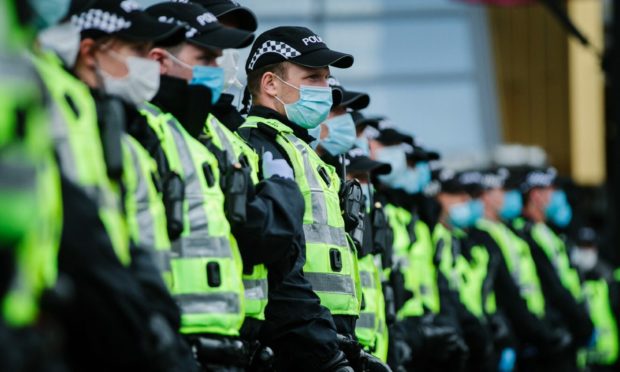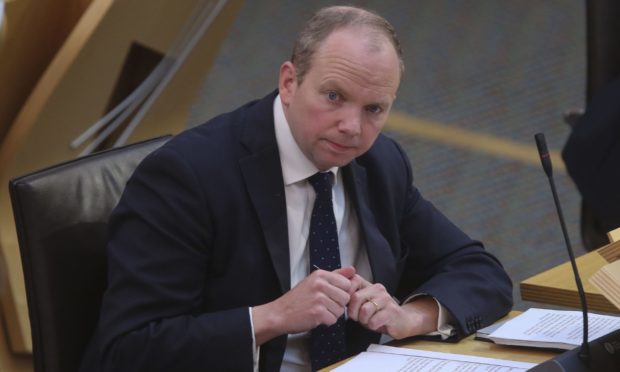A leading campaigner against sectarian abuse warned it is “lazy” to dismiss the social scandal as a Glasgow issue.
Dave Scott, of Nil By Mouth, called for a renewed national focus after clips emerged online of anti-Irish chanting in the city at the weekend.
His call is being backed by a Tory MSP who wants to use the new parliamentary term at Holyrood to “reset” the conversation between different parties.
Mr Scott noted previous charges related to sectarian abuse across the country and highlighted “deep rooted” problems nationally.
“It’s lazy to dismiss this as a football problem or a central belt problem – this is a national story,” Mr Scott said.
Footage posted on social media showed Rangers fans marching through the city centre attended by police on Sunday afternoon apparently chanting an anti-Irish song referring to the famine.
Politicians condemned the scenes and a senior police officer said he expects a “number of arrests”.
For those hurling racist abuse at our Irish community telling them to "go home" – Scotland is their home.
Disgusted to once again see anti-Irish racism rear its ugly head. Solidarity with our Irish community.
I am sure Police Scot will hold those responsible to account.
— Humza Yousaf (@HumzaYousaf) August 29, 2021
Mr Scott said: “It happened in Glasgow but I’m willing to bet not everyone involved lived inside the city boundaries. It travels with people. There have been arrests before in all or nearly all parts of the country.
“It’s a hot-button topic in some areas but hatred doesn’t respect geography like that.”
How is Holyrood tackling sectarianism?
Former first minister Jack McConnell called sectarianism Scotland’s “secret shame” in a landmark speech in 2002.
It marked the beginning of a major effort at the Scottish Parliament in the first term of devolution.
Ten years later, Alex Salmond’s government brought in laws to crack down on sectarian hatred at football matches.
The short-lived Offensive Behaviour at Football and Threatening Communications Act was branded “mince” by a Dundee Sheriff and was repealed after Holyrood opposition pressure in 2018.
Another attempt to bring parties together failed last year.
Highlands and Islands Conservative MSP Donald Cameron was among a group who tried to set up a cross-party panel at Holyrood.
He said the time is right to try again.
“We have new parliament and there is a renewed impetus to tackle an issue which for years – centuries – has been a stain on Scotland’s reputation,” he told us.
“I’d like to set up a group to look at a way forward but it has to be done with the right people and without going in to quickly and standing against football clubs or other groups.”
Identity politics
Mr Scott, who joined the early conversations with the first group’s attempt, which was led by the SNP’s James Dornan, called again for MSPs to show leadership.
“We’re living in an era of identity politics, for better or worse,” he said.
“I would urge politicians to think about what they’re talking about. Don’t tick the lowest common dominator box.”
I fully expect a number of arrests to be made.
– Bernard Higgins, Police Scotland
On Monday, Assistant Chief Constable Bernard Higgins defended officers from claims they stood by instead of making arrests in Glasgow.
“We did not facilitate this event and to say so is inaccurate,” he said in a Police Scotland statement.
Officers on patrol came across the group but had to call for back-up.
“I fully expect a number of arrests to be made,” he added.
“This type of anti-Irish Catholic behaviour is wholly unacceptable.”
‘Scotland is their home’
Mr Higgins also appeared to highlight the broader problem.
He added: “The challenges of the sectarianism still evident in some parts of Scotland are a much broader societal problem and, whilst policing will have a role to play in addressing the symptoms, its causes are a problem which require a more effective, joined-up, civic response.”
Pressure group Call It Out, which campaigns against anti-Catholic bigotry and anti-Irish racism in Scotland, called on the Scottish Government and Glasgow City Council to take action.
The group posted on social media: “This is the kind of racism you don’t notice, day after day, week after week, year after year, decade after decade.”
Scottish Labour justice spokeswoman Pauline McNeill said: “There are already laws in place to deal with criminal behaviour, the idea that without the Offensive Behaviour at Football Act, thousands of people can sing racists songs on the streets of Glasgow without fear of prosecution is ridiculous.”
The incident happened after Rangers beat Celtic 1-0 at Ibrox.
Hate crime in numbers:
There were 267 charges reported to the Crown Office in the first year of the Offensive Behaviour Act. It rose to 377 by 2016-17, before the law was scrapped.
An official report, published by the government that year, noted the accused people were affiliated with 20 football teams.
Only a small fraction related to teams outside Glasgow and Edinburgh.
Catholicism was the main religious target of hatred in each year of the Act, the figures show.
Hate crime laws were updated earlier this year at Holyrood. It adds a “stirring up” offence which applies to age, disability, race, religion, sexual orientation and transgender identity.
Police recorded 6,448 hate crimes in 2019-20.
There were 501 hate crimes categorised as religiously aggravated. Among that number, around two-fifths showed prejudice to Catholics.
In over a quarter of those crimes, prejudice was shown towards the Muslim community. In one in ten it was towards the Protestant community.

